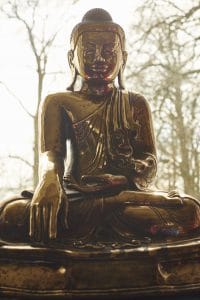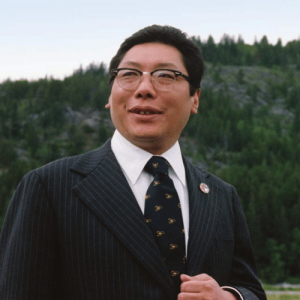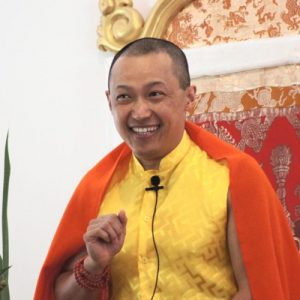The word ‘lineage’ means a line of instruction/transmission that has been passed down from teacher to disciple throughout history.
Shambhala Buddhism is a path towards realising bravery, dignity, and kindness, with an emphasis on the need for cultivating enlightened, or uplifted society, free from personal and national ego-centrism. It is inspired by the teachings of the Buddha, as well as many teachers from the Kagyü and Nyingma schools of Tibetan Buddhism.
It was founded by Chögyam Trungpa Rinpoche in the 1970’s. It draws on a wide variety of contemplative traditions and offers a comprehensive path of mindfulness and awareness meditation practice and study. The premise of the Shambhala tradition is that basic human goodness and wisdom transcend any one culture or religion. It is a secular, non-religious approach, embodying essential values and principles recognised by many cultures throughout history.
Chögyam Trungpa Rinpoche
Chögyam Trungpa Rinpoche, holder of the Kagyü and Nyingma lineages of Tibetan Buddhism, founded the Shambhala Buddhist lineage.
Born in Tibet in 1939, Trungpa Rinpoche was recognised at an early age as a tülku, or reincarnated teacher. Following the Chinese invasion he fled Tibet in 1959, and four years later went to Britain and America. From that time until his death in 1987, he worked tirelessly to bring the living teachings of meditation to the Western world, establishing several major practice centres, over one hundred meditation centres, and Naropa University.
Author of many books, Trungpa Rinpoche is renowned for his remarkable ability to present the highest essence of Tibetan Buddhist teachings in a form accessible to people today
For more biographical information, excerpts of his writings, examples of his artwork, and photographs please visit the Our Story section of the Shambhala International website.
Sakyong Mipham Rinpoche
From 1990, Sakyong Mipham Rinpoche succeeded his father, Trungpa Rinpoche as the leader of the Shambhala community. In early 2018, allegations surfaced of sexual misconduct and misuse of power by the Sakyong toward his students. As a result he stepped back from all administrative and teaching responsibilities in Shambhala and relocated to Nepal, agreeing to the establishment of an independent Board of Directors to hold full responsibility for Shambhala.
Shambhala is now self-governing and financially independent of Sakyong Mipham Rinpoche. He is no longer engaged in its activity and is teaching through his own organization, the Sakyong Potrang.
Senior students in the Shambhala community continue to offer teachings and trainings, maintain local meditation and retreat centres, and host eminent Buddhist teachers from the Tibetan Kagyu and Nyingma traditions.
(You may view fuller details on these events at this archive of communications that was independently collated by a Shambhala community member, and at our Community Care website.)



